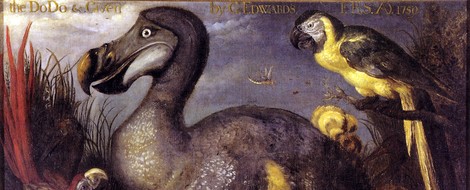Your podcast discovery platform
Curious minds select the most fascinating podcasts from around the world. Discover hand-piqd audio recommendations on your favorite topics.

piqer for: Global finds Technology and society Health and Sanity
Nechama Brodie is a South African journalist and researcher. She is the author of six books, including two critically acclaimed urban histories of Johannesburg and Cape Town. She works as the head of training and research at TRI Facts, part of independent fact-checking organisation Africa Check, and is completing a PhD in data methodology and media studies at the University of the Witwatersrand.
What The Dodo Teaches Us About Lost Ecosystems & How Climate Degradation Hastens Extinction Events
Twilight Beasts is one of those wonderful narrative scientific discoveries – whimsical enough to make for compelling reading, but with more than enough good, cross-referenced proper palaeoscience.
This post covers the imagined final days of the last Mauritian Dodo – a large flightless bird that became extinct in 1700. The Dodo became a general metaphor for extinction (and, also, futility or stupidity, owing to its inability to escape its fate).
This post initially caught my attention because of its plaintive title, about the final "squawk" of the last, lonely Dodo. It reminded me of a quote from 18th Century French explorer Francois le Vaillant, who described the cry of the (soon to be extinct) South African quagga as having a "perfect resemblance to the barking of a dog."
Like the Dodo, the quagga became extinct not long after Europeans arrived in the region. Unlike the Dodo, however, the quagga was probably already in what researchers have described as an extinction spiral. Man just hastened its demise.
As I read the Dodo post, I realised my own understanding of the bird's demise was inaccurate – I had assumed it had been hunted out, easy prey for sailors visiting the small island. Instead, what happened was that the Dodo's forest habitat was destroyed by humans. And then their dogs and cats, and the ships' rats, preyed on the birds or their precious single eggs. The Dodo, which had previously had no natural predators, was simply unable to adapt. Several other species of birds and reptiles unique to Mauritius also went extinct.
The simple explanation of this almost domestic extinction process is one that is being played out again, at a hyper-local level and at a systemic and global scale, today. It is worth revisiting the lessons of our past, and understanding our own role and responsibility in the actions of the present.
